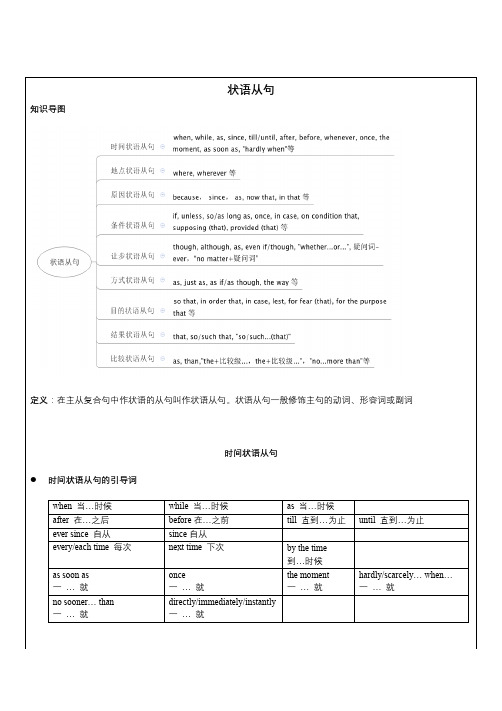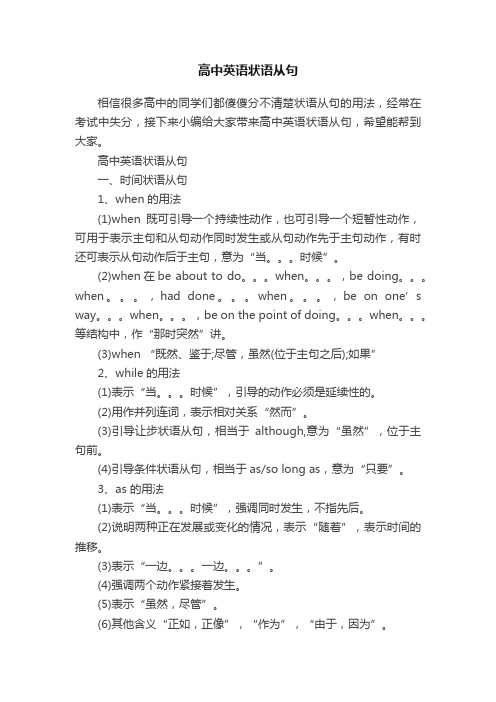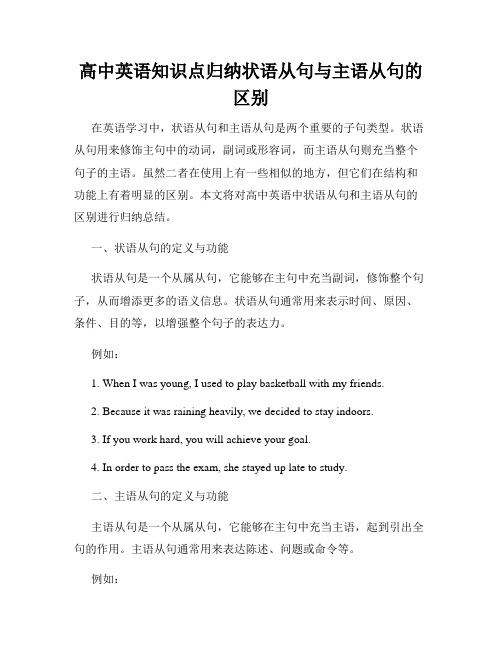高一英语状语从句
高中英语语法课件_状语从句 (共42张PPT)

whether…or…
whether…or…引导的让步状语从句: △ 这种从句也称“选择条件-让步状语从句”,可位于 主句之前或之后,如: 1.Whether you like it or not, you’ll have to do it. 2. We hold that all countries, (whether they are) big or small, (whether they are) rich or poor, should be equal. 3. Whether it rains or snows, I will go tonight. 5. She had to go, whether or not she wanted it.
2) 一些表示时间的名词词组也可引
导时间状语从句。如:the moment, the minute, (一…就)next time (下次), every/each time (每 次)。 e.g. The moment he comes, I will tell him.
4) as soon as, immediately, directly, instantly 等副词也可引 导状语从句。表示“一…… 就……”。
.
1. I was so familiar with him that I recognized his voice ______ I picked up the phone. A. while B. after C. In case D. the minute 2. How long do you think it will take _______ our product becomes popular with the consumers? A. when B. until C. before D. since
高中英语语法总结之状语从句(共37张ppt)

• Difficulties are nothing if we are not afraid of them.如果我们不怕困难,困难就算不了什 么了。
• We shall go there tomorrow unless it rains. = We shall go there tomorrow if it doesn’t rain. 除非下雨,我们明天就去那里。
• Every time I travelled by boat, I got seasick.我 每次乘船都晕船。
• The moment I heard the song, I felt cheerful. 我一听到这首歌,就感到很愉快。
• Next time you come ,you’ll see him.下次你来 的时候,就会见到他。
• We were not tired though (although) we had worked all day.虽然我们干了一天活,但并 不累。
• (2)even if, even though(even if 和even though的意思为“即使”“纵使”有退一步 设想的意味,多用于书面语中)。
• 5、结果状语从句:
• (1)so that,so…that(so that前有逗号为 结果状语从句,so…that的so后面跟形容词 或副词)。
• We turned up the radio, so that everyone heard the news.我们把收音机的音量放大, 大家都听到了新闻。
• Seeing (that) he was badly ill, we sent for the doctor.鉴于他病情严重,我们派人去请医生 去了。
高中英语--状语从句专题讲解(详细)

注:
“no sooner…than…”,“hardly…when…”引导时间状语从句时,主句用过去完成时,从句用一般过去时。此外,当把no sooner, hardly/scarcely提到句首时,主句用部分倒装。
as意为“随着,一边…,一边…”,常有以下用法:
a)用于表示两个动作同时或者几乎同时发生。
b)表示两个发展变化中的情况。
c)表示在某事发生的过程中另外一件事发生。
d)表示随着短暂动作的发生,另一动作立刻发生。
before和after引导的时间状语从句
before意为“在…之前”,表示主句动作发生在从句动作之前。
=I hardly told him the news when he stopped listening.
地点状语从句
地点状语从句的引导词有when和wherever。
where, wherever指具体地点时,从句可用于主句之前或之后;
where, wherever表示抽象概念的含义时,从句需放在主句前。
When hehad finishedhis homework, hetooka short rest.(先发生+后发生)
When Igotto the airport, the guesthad left.(后发生+先发生)
注:
when还可表示原因,意为“既然”,引导原因状语从句;也可以用作并列连词,意为“就在那时”,常构成如下结构:
A number of high buildings have arisen where there was nothing a year ago but ruins.(where表示具体地点)
高一英语时间状语从句单选题50题

高一英语时间状语从句单选题50题1. I was reading a book ____ the teacher came into the classroom.A. whenB. whileC. asD. since答案:A。
解析:when可表示在一个动作发生时,另一个动作突然发生。
此句表示当老师走进教室这个动作发生时,我正在看书这个动作正在进行,强调突然性。
while通常表示两个动作同时进行,强调动作持续的时间段,这里强调的不是同时进行的时间段,所以B不正确。
as表示两个动作同时进行,强调一边一边,这里不符合语境,C错误。
since表示自从,引导原因状语从句或时间状语从句表示从过去某时开始,与本题语境不符,D错误。
2. ____ we were having a PE class, it began to rain heavily.A. AsB. WhenC. WhileD. Because答案:C。
解析:while强调在一个较长的动作进行过程中,另一个动作发生。
这里我们正在上体育课是一个持续的动作过程中,开始下大雨这个动作发生了。
as虽然也表示同时进行,但更强调两个动作的同时性和平行性,这里强调的是在体育课进行过程中下雨,所以A不太合适。
when主要强调一个动作发生时另一个动作突然发生,这里不是突然性,B错误。
because表示原因,不符合本题语境,D错误。
3. He was singing ____ he was taking a shower.A. whenB. whileC. asD. after答案:B。
解析:while强调两个动作同时进行,这里唱歌和洗澡这两个动作是同时进行的。
when强调一个动作发生时另一个动作突然发生,这里不是突然性的关系,A错误。
as表示一边一边时更强调动作同时性和平行性,这里不如while合适,C错误。
after表示在之后,与本题同时进行的语境不符,D错误。
高中英语状语从句

高中英语状语从句相信很多高中的同学们都傻傻分不清楚状语从句的用法,经常在考试中失分,接下来小编给大家带来高中英语状语从句,希望能帮到大家。
高中英语状语从句一、时间状语从句1、when的用法(1)when既可引导一个持续性动作,也可引导一个短暂性动作,可用于表示主句和从句动作同时发生或从句动作先于主句动作,有时还可表示从句动作后于主句,意为“当。
时候”。
(2)when在be about to do。
when。
,be doing。
when。
,had done。
when。
,be on one’s way。
when。
,be on the point of doing。
when。
等结构中,作“那时突然”讲。
(3)when “既然、鉴于;尽管,虽然(位于主句之后);如果”2、while的用法(1)表示“当。
时候”,引导的动作必须是延续性的。
(2)用作并列连词,表示相对关系“然而”。
(3)引导让步状语从句,相当于although,意为“虽然”,位于主句前。
(4)引导条件状语从句,相当于as/so long as,意为“只要”。
3、as 的用法(1)表示“当。
时候”,强调同时发生,不指先后。
(2)说明两种正在发展或变化的情况,表示“随着”,表示时间的推移。
(3)表示“一边。
一边。
”。
(4)强调两个动作紧接着发生。
(5)表示“虽然,尽管”。
(6)其他含义“正如,正像”,“作为”,“由于,因为”。
4、before的用法(1)一般意为“在。
之前”“。
才”,“。
就”“还没有。
”“免得”“不知不觉”“宁可,宁愿”,“否则,要不然”。
(2)It + will be/was + 时间段+before+一般现在时/一般过去时。
在肯定句中,意为“多长时间之后才”;在否定句中,意为“用不了多长时间就”。
5、until和till(1)与肯定句连用,必须是延续性动词。
(2)与否定句连用,必须是非延续性动词,表示“直到。
才,在。
之前不。
高中英语知识点归纳状语从句与主语从句的区别

高中英语知识点归纳状语从句与主语从句的区别在英语学习中,状语从句和主语从句是两个重要的子句类型。
状语从句用来修饰主句中的动词,副词或形容词,而主语从句则充当整个句子的主语。
虽然二者在使用上有一些相似的地方,但它们在结构和功能上有着明显的区别。
本文将对高中英语中状语从句和主语从句的区别进行归纳总结。
一、状语从句的定义与功能状语从句是一个从属从句,它能够在主句中充当副词,修饰整个句子,从而增添更多的语义信息。
状语从句通常用来表示时间、原因、条件、目的等,以增强整个句子的表达力。
例如:1. When I was young, I used to play basketball with my friends.2. Because it was raining heavily, we decided to stay indoors.3. If you work hard, you will achieve your goal.4. In order to pass the exam, she stayed up late to study.二、主语从句的定义与功能主语从句是一个从属从句,它能够在主句中充当主语,起到引出全句的作用。
主语从句通常用来表达陈述、问题或命令等。
例如:1. What he said surprised me.2. Whether they can win the game remains to be seen.3. That she is a talented singer is beyond doubt.4. It is important to learn a foreign language.三、状语从句与主语从句的结构1. 状语从句的结构:状语从句通常由引导词引出,包括连词when, while, before, after, since, as soon as, until, unless等;连词because, as, since等表示原因;连词if, unless表示条件;连词so that, in order that表示目的。
高一英语状语及状语从句
yours. 4. The electric current must have been turned off, for the light went out. 陈述间接的、
9. They worked there so carefully that they
didn’t notice I was passing by. 9. 结果状语从句
1. 时间状语从句 1. While I was sitting there, he told me an interesting story. 2. The play went on until the candles went out. 3. We didn’t begin our meeting until the chairman came. 4. How have you been since I saw you last? 5. Hardly had we gathered in the wheat when it began to rain.=We had hardly… 6. I came to the house the moment he was about to leave. 7. We talked as we walked.
I
stood there, astonished by the dangerous performance.
Walking The
along the shore, they felt comfortable.
高中英语知识点归纳状语从句与表语从句的区别
高中英语知识点归纳状语从句与表语从句的区别高中英语知识点归纳:状语从句与表语从句的区别状语从句和表语从句是英语语法中的两个重要概念,它们在句子中分别担任不同的语法角色。
本文将详细介绍状语从句和表语从句的定义、特点以及在句子中的用法,并进行比较,以帮助学生更好地理解和运用这两个语法知识点。
一、状语从句的定义与特点1. 定义:状语从句是句子中的一个从句,用来修饰或补充主句的动词、形容词、副词等。
它通常回答“如何?为什么?在什么条件下?”等问题,表示主句的情况、原因、时间、方式、条件以及目的等。
2. 特点:- 在句子中充当状语的成分,修饰主句的动词、形容词、副词等。
- 状语从句通常由连词引导,如when, because, if, although等。
- 状语从句和主句之间是主从关系,不能独立成句。
举例:1. When it rains, I stay at home.(时间状语从句)2. Because he studied hard, he passed the exam.(原因状语从句)3. If I have time, I will go shopping.(条件状语从句)4. Although she is tired, she keeps working.(方式状语从句)二、表语从句的定义与特点1. 定义:表语从句是句子中的一个从句,用来充当主句的表语,对主语进行补充和说明。
它常常回答“是什么?”等问题,起到对主语进行解释的作用。
2. 特点:- 在句子中充当主、谓语之一,对主语进行补充和说明。
- 表语从句通常由连系动词(be动词、感官动词、使役动词等)引导,如is, seem, feel, make等。
- 表语从句和主句之间构成主谓关系,可以独立成句。
举例:1. My dream is that I can travel around the world.(宾语从句)2. He seems to be a good student.(主语从句)3. The problem is how to solve it.(表语从句)4. The news made me very happy.(宾语从句)三、状语从句与表语从句的区别1. 语法角色不同:状语从句在句子中充当状语成分,而表语从句充当主、谓语之一,进行补充说明。
高一常见知识点梳理从句与状语从句
高一常见知识点梳理从句与状语从句高一常见知识点梳理:从句与状语从句从句和状语从句是高中英语中常见而重要的语法知识点。
掌握了从句和状语从句的用法和特点,可以帮助我们更准确地表达自己的意思,丰富句子结构,提高语言表达能力。
本文将对高一常见的从句和状语从句进行梳理和归纳。
一、从句的基本概念从句是一个句子的组成部分,不能独立存在,依附于主句,起到某种句子成分的作用。
从句分为名词性从句、定语从句和状语从句三种类型。
1. 名词性从句名词性从句在句中充当名词的成分,可以作主语、宾语、表语和同位语。
例如:- 主语从句: What he said is true. (他说的是真的。
)- 宾语从句: I know that he is coming. (我知道他要来。
)- 表语从句: The truth is that I am tired. (事实是我很累。
)- 同位语从句: His hope is that he can pass the exam. (他的希望是能通过考试。
)2. 定语从句定语从句用来修饰名词或代词,相当于一个形容词。
关系代词引导定语从句。
例如:- The book that I borrowed from the library is very interesting. (我从图书馆借来的那本书非常有趣。
)3. 状语从句状语从句用来表示时间、原因、条件、方式、结果等,相当于一个副词。
常用的连接词有when、because、if、how、so等。
例如:- When you finish your homework, you can go out to play. (当你完成作业时,你可以出去玩。
)- He failed the exam because he didn't study hard. (他考试不及格是因为他没有努力学习。
)- If it rains tomorrow, we will stay indoors. (如果明天下雨,我们就呆在室内。
高中英语语法课件- 状语从句
4. 表示“随着…..〞.常指一个行为是另一个行为的结果, 或一种状态随另一种状态变化。句中的动词多表示状态 的开展变化。As she grew older, she became more beautiful.
*过去情况
e.g. I hurt my should while I was doing gym.
While 在句中的不同含义:
While I was walking down the street, I came across an old friend. ( while=__w_h_e_n__)
while:持续性动词 /进行时
*一般或现在情况
e.g. I like listening to music while I am doing my homework.
*将来情况-V一般现在时或现在进行时
e.g.— I’m going to the post office. -- While you are there, can you get some stamps for me?
• 4. You are welcome to come back at any time you want to.
• 5. At the last time she saw James, he was lying in bed.
• 语法规那么:every time,each time,next time,the first time,any
voice came to his ears.
A. why B. where C. when D. while
- 1、下载文档前请自行甄别文档内容的完整性,平台不提供额外的编辑、内容补充、找答案等附加服务。
- 2、"仅部分预览"的文档,不可在线预览部分如存在完整性等问题,可反馈申请退款(可完整预览的文档不适用该条件!)。
- 3、如文档侵犯您的权益,请联系客服反馈,我们会尽快为您处理(人工客服工作时间:9:00-18:30)。
I. 讲解1. 概述状语从句在句中相当于副词做状语,又叫副词性从句。
掌握状语从句应当引导词入手,注意引导词的词义,引导状语从句的引导词都有词意,所以,了解引导词的意思尤为重要。
引导词按意义分为九类:1) 时间when , as , while , till , until , before, after , since 2) 地点where3) 原因because , as , since , now that 4) 条件if , unless , once .so (as)long as . in case5) 让步though , whatever (---ever) as, even though, even if 6) 目的so that, in order that7) 结果so ... that 8) 比较than, as .. as9) 方式as , as if例如:1. I fell asleep _____________ he was doing his exercises.2. _____________ he arrived in Shanghai, his mother met him at the station.3. She always sings _____________ she walks.4. I waited _____________ he had finished his work.5. It was not long _____________ he told me about this affair.6. He has worked very hard _____________ he entered the factory.7. _____________ he had finished the work, he went home.8. _____________ there is a will, there is a way.9. She didn't come to school _____________ she was ill.10. _____________ he did not know much English, he looked up the word in the dictionary.11. _____________ I've told you twice, you must know it.12. _____________ he says that, he will do it.13. _____________ I receive the letter from him, I won't write to him again.14. _____________ you work hard, you are sure to succeed.15. _____________ we were neither very big nor very strong, we were a good team.16. _____________ she is, she'll have to wait.17. Poor _____________ he was, he was honest.18. It also shows you the caller's telephone number _____________ you can recognize who it is.19. He was so excited _____________ he could not say a word.20. He works as hard _____________ he used to.2. 应注意的几个问题:1) 状语从句中用现在时代替将来时;2) because不与so连用,表示"因为...所以"二者只能选择其一; though ( although )不与but连用,表示“虽然...但是” , 二者只能选择其一.3) 同一引导词可以引导不同种类的从句.如: whereYou’ll find it where it was.(_________从句) Tell me the address where he lives. (__________从句)I don’t know where he came from. (________从句) Where he has gone is not known yet. (_________从句)This is where they once lived. (_________从句)II.巩固练习1. John shut everybody out of the kitchen ______he could prepare his grand surprise for the party.A. whichB. whenC. so thatD. as if2. I would appreciate it ________you call back this a fternoon for the doctor’s appointment.A. untilB. ifC. whenD. that3. After the war, a new school building was put up ________there had once been a theatre.A. thatB. whereC. whichD. when4. —Is Mr. Smith in the office?—Yes, ________ he is in charge of the office, he must be there.A. sinceB. howeverC. whetherD. for5. As your good friend, I will do ________help you.A. that I can toB. what I can toC. all that I canD. what I can6. John may phone tonight. I don’t want to go out ________he phones.A. as long asB. in order toC. in caseD. so that7. Someone called me up in the middle of the night, but they hung up ________I could answer the phone.A. asB. sinceC. untilD. before8. No matter ________hard it may be, I will carry it out.A. whatB. whateverC. howD. however9.________ you may do, you must do it well.A. WhichB. WheneverC. WhateverD. When10.________ y ou are so weak, you’d better stay at home.A. SinceB. ForC. BecauseD. Though11. English and French are taught here. You can choose ________you like.A. no matter whichB. whicheverC. whichD. whatever12. I saw Mr. Smith last Sunday. We had not seen each other ________I left London.A. asB. beforeC. sinceD. till13. The problem won’t be settled until we ________a chance to discuss it tho roughly.A. have hadB. will haveC. will have hadD. would have14. If you ________this experiment, you will understand the theory better.A. will be doingB. have doneC. will have doneD. would do15. They went on working ________it was late at night.A. even ifB. as ifC. howeverD. as though16. The volleyball match will be put off if it ________.A. will rainB. rainsC. rainedD. is raining17.________ you talk to someone or write a message, you show your skills to others.A. At timesB. Some timeC. By the timeD. Every time18. Although he is considered a great writer, ________.A. however his works are not widely readB. but his works are not widely readC. his works are not widely readD. and his works are not widely read19. We should finish the important job, ________.A. long it takes howeverB. it takes however longC. long however it takesD. however long it takes20.________he made an important speech at the meeting was true.A. ThatB. WhyC. WhatD. How21.________comes to the party will receive a gift.A. WhichB. WhoC. Which oneD. Whoever22. She is willing to help you, ________busy she is.A. whatB. howC. howeverD. whatever23. No matter ________hard it may be, I’ll carry it out.A. whatB. whateverC. howD. however24. W hy do you want to find a new job ________you’ve got such a good one already?A. thatB. whereC. whichD. when25.________he is, he will be thinking of you.A. WhereverB. WhereC. Now thatD. As soon as26. You should make it a rule to leave things ________you can find them again.A. whenB. whereC. thenD. there27. He got excited at the news, ________ I was calm.A. whenB. whileC. becauseD. after28. —Shall Brown come and play computer games? —No, ________ he has finished his homework.A. whenB. ifC. unlessD. once29.________ you try, you will never succeed.A. IfB. UntilC. SinceD. Unless30. Hardly had he arrived in Hong Kong ________he rang me up.A. whenB. thanC. thatD. and31. What we have seen is different ________.A. from what we heardB. to all what we heardC. to what we have heardD. from what we have heard32. We will never give in ________they might do or say about our plan.A. no matter howB. howC. whateverD. although33. It’s no wonder you’ve got a headache ________you drank so much last night.A. thoughB. in caseC. whenD. while34. I wonder if I________ time. If I ________time, I’ll go with you.A. have; haveB. will have; will haveC. have; will haveD. will have; have35.________ I live, I will never give in to the enemy.A. As far asB. As long asC. As well asD. As soon asIII.完形提升“A robbery (抢劫案)...” a voice came from the radio. John was driving home late last night from a trip, and now he was having trouble staying 1 . He turned 2 the radio and tried to fix his attention on the 3 , but his eyes kept on closing.It was 4 that he noticed the hitchhiker (搭便车者) by the road. 5 even thinking about what he was doing, he stopped the car.“To Midrille?” “Get in.” The hitchhiker got in and immediately John was 6 that he had picked him up. The young man 7 a strange face and long hair. When John asked him questions about himself, he changed the 8 .John 9 the news. He began to sweat (出汗) and his thoughts 10 nervously (紧张地) to all the money he was 11 .At the next small town he stopped his car and said, “I’m sorry. I’m so 12 that I can’t drive you to Midrille. I think I’ll find a 13 and spend the night.”The young man slowly 14 into his pocket. “This is it!” thought John. At that15 moment he considered shouting for help, but instead of a gun, the hitchhiker pulled out several 16 . “Oh, no. I don't want your money. Just get out. Okay?”The young man looked 17 . He insisted on 18 John the money. John watched until his 19 had disappeared from sight, then stepped on the 20 and drove out of town.1. A. asleep B. early C. strong D. awake2. A. on B. off C. up D. over3. A. outside B. news C. speed D. way4. A. there B. earlier C. then D. moment5. A. Without B. After C. By D. For6. A. happy B. sad C. angry D. sorry7. A. wore B. owned C. had D. made8. A. place B. subject C. question D. face9. A. remembered B. thought C. heard D. forgot10. A. got B. arrived C. changed D. turned11. A. paying B. having C. carrying D. borrowing12. A. afraid B. hungry C. cold D. sleepy13. A. restaurant B. shop C. hotel D. station14. A. reached B. forced C. got D. put15. A. important B. very C. long D. short16. A. knives B. photos C. handkerchiefs D. bills17. A. frightened B. puzzled C. worried D. curious18. A. giving B. offering C. handing D. returning19. A. driver B. friend C. passenger D. thief20. A. door B. gas C. window D. motorIV. 阅读理解AJerry was the kind of guy you love to hate from the bottom of your heart, for he was always in a good mood and always had something positive to say. When asked how he was able to do so, he would reply, “If I were any better, I would be twins!”There was no doubt that Jerry was unique because he had several followers who were in his shadow from restaurant to restaurant. Obviously, these colleagues were greatly touched by Jerry’s attitude so as to follow him here and there. Being a natural motivator, Jerry was there telling the employee how to look on the positive side of the situation whenever he or shewas having a bad day.Curious about his style, I went up to Jerry and asked him, “I can’t believe it! You can’t be a positive person all the ti me. How do you do it? ” Jerry replied, “Each morning I wake up and say to myself, ‘Jerry, you have two choices today. You can choose to be in a good mood or in a bad mood.’ I choose to be in a good mood. Each time something bad happens, I can choose to be a victim or to learn from it. I choose to learn from it. Every time someone comes to me complaining, I can choose to accept their complaining or to point out the positive side of life. I choose the positive side of life.”“Yeah, right, it’s not that easy,” I protested. “Yes, it is,” Jerry said. “Life is all about choices. When you cut away all the junk, every situation is a choice. You choose how you react to situations. You choose how people will affect your mood. You choose to be in a good mood or bad mood. The bottom line: It’s your choice how you live life.”I reflected on what Jerry said. Soon after, I left the restaurant industry to start my own business. We lost touch, but I often thought about him when I made a choice about life instead of reacting to it.Several years later, I heard that Jerry did something you are never supposed to do in a restaurant business: he left the back door open one morning and was held up at gunpoint by three armed robbers. While trying to open the safe, his hand, shaking from nervousness, slipped off the combination. The robbers panicked and shot him. Luckily, Jerry was found relatively quickly and rushed to the local hospital. After 18 hours of surgery and weeks of intensive care, Jerry was released from the hospital with fragments of the bullets still in his body.I bumped into Jerry about six months after the terrifying accident. When I asked him how he was, he replied, “If I were any better, I’d be twins. Want to see my scars?” I declined to see his wounds, but did ask him what had gone through his mind as the robbery took place. “The first thing that went through my mind was that I should have locked the back door,” Jerry replied. “Then, as I lay on the floor, I remembered that I had two choices: I could choose to live, or I could choose to die. I chose to live.” “Weren’t you scared?” I asked.Jerry continued, “The paramedics were great. They kept telling me I was going to be fine. But when they wheeled me into the emergency room and I saw the expressions on the faces of the doctors and nurses, I got really scared. In their eyes, I read, ‘He’s a dead man.’ I knew I needed to take action.” “What did you do?” I asked. “Well, there was a big nurse shouting questions at me,” said Jerry. “She asked if I was allergic to anything. ‘Yes’ I replied. The doctors and nurses stopped working as they waited for my reply. I took a deep breath and yelled, ‘Bullets’. Over their laughter I told them, ‘I am choosing to l ive. Operate on me as if I am alive, not dead.’ ”Jerry lived thanks to the skill of his experienced doctors, but also because of his amazing attitude. I learned from him that every day we have the choice to live fully.1. By saying “If I were any better, I would be twins” (Paragraphs 1&7), Jerry means that _______.A. he felt depressed in lifeB. he was content with his lifeC. he regretted not having a twin brotherD. he attempted to live as good a life as his twin brother2. According to Paragraph 3, what did the writer think of Jerry’s positive thinking style at first?A. He accepted it and tried to copy it.B. He was jealous of and even hated it.C. He failed to understand it and tended to confirm it.D. He was in favor of and reflected on it.3. Why did Jerry think he needed to take action in hospital?A. He couldn’t bear the rudeness of a big nurse.B. The medical staff were not skilled enough to save him.C. He was in danger and had to follow the nurses’ instructions.D. He had to encourage the doctors and nurses for the operation.4. The underlined part “declined to” (Paragraph 7) can best be replaced by________.A. refused toB. promised toC. agreed toD. intended to5. Which of the following would best describe Jerry according to the passage?A. Positive and cautious.B. Unique and unselfish.C. Humorous and optimistic.D. Outstanding and ambitious.6. Which of the following is conveyed in this article?A. Jerry’s survival is a miracle.B. Attitude is everything.C. Unique people may achieve success.D. Choices mean success.1-6 BDBAC概述:1. when/as/while 2. When 3. as 4. until 5. before 6. since 7. After 8. Where 9. because 10. As 11. Now that/Since 12. Once/ If 13. Unless 14. So long as/ Only if 15. Though/Although 16. Whoever/No matter who 17. as / though 18. in order that/ so that 19. that 20. as1-5 CBBAB 6-10 CDCCA 11-15 BCABA 16-20 BDCDA 21-25 DCCDA 26-30 BBCDA 31-35 DCCDB本文记叙了John在旅行回家途中让一个人搭便车,却误认为他会抢劫而在半路让其下车的事。
